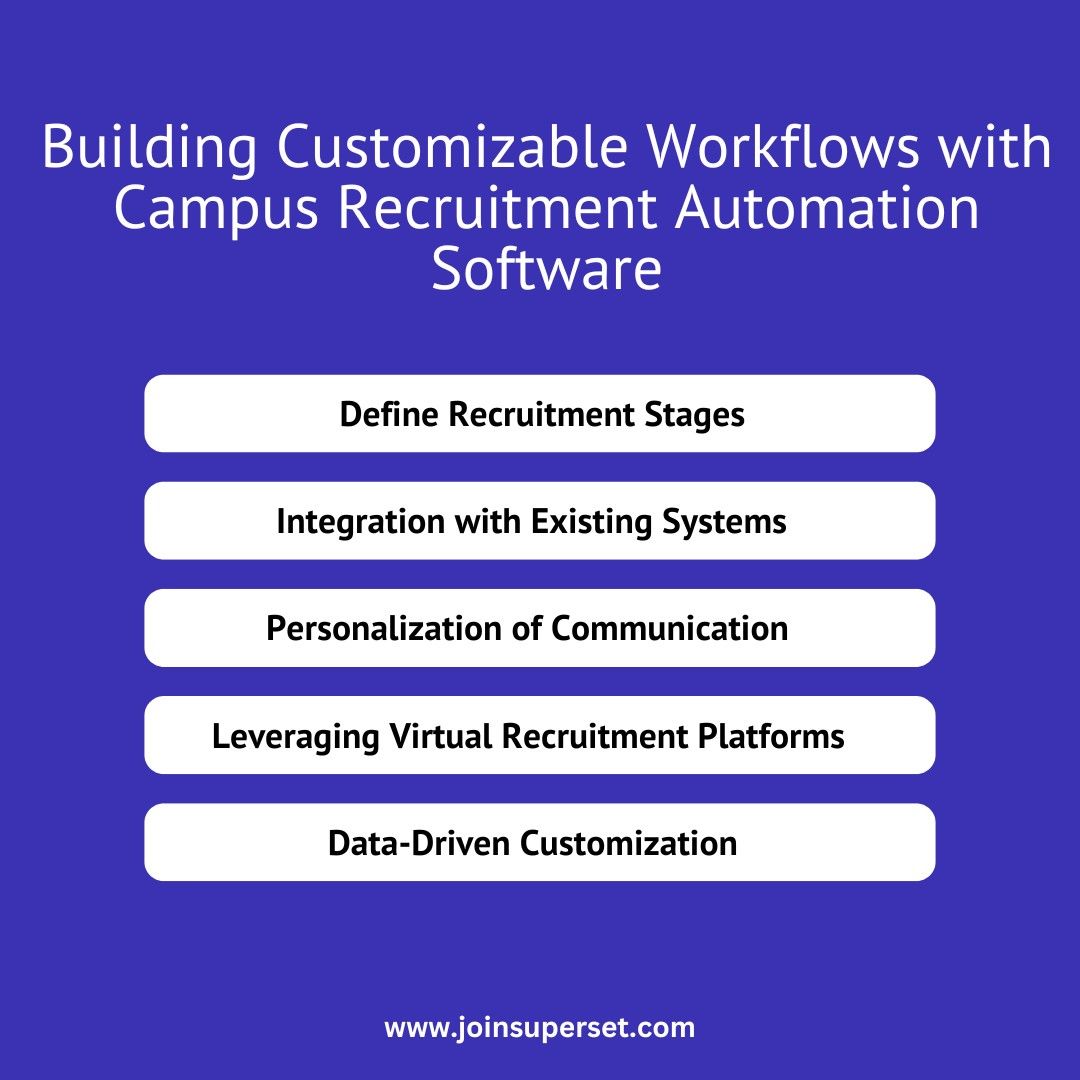The landscape of campus recruitment has transformed dramatically over the past decade. As companies compete to attract the best talent, more than traditional methods of campus hiring is required. The advent of technology, especially campus recruitment automation software, has revolutionized how companies approach the recruitment process. Among the most significant advancements is the introducing of customizable workflows, enabling organizations to tailor their recruitment strategies to meet unique business needs. In this blog, we will explore how customizable workflows within campus recruitment automation software are helping companies streamline their online campus recruitment processes, enhance efficiency, and ensure that they hire the best candidates.
The Rise of Campus Recruitment Automation
Campus recruitment is critical for companies looking to inject fresh talent into their workforce. However, the traditional recruitment process has long been plagued by inefficiencies. The need to manually shift through thousands of resumes, schedule interviews, and communicate with candidates often leads to delays and missed opportunities. Campus recruitment automation software addresses these challenges by automating repetitive tasks, providing companies with a more streamlined and efficient recruitment process. But beyond mere automation, these platforms now offer customizable workflows that allow companies to tailor the recruitment process to their needs.
Why Customizable Workflows Matter
No two companies are alike. Each has its own set of values, objectives, and operational challenges. As such, a one-size-fits-all approach to recruitment can be limiting. Customizable workflows allow companies to design and implement a recruitment process that aligns with their unique business needs.
Here’s how customizable workflows can benefit companies:
- Alignment with Company Goals: Companies can create workflows that reflect their strategic objectives. For instance, if diversity and inclusion are a priority, the workflow can be customized to include specific stages for diversity hiring initiatives.
- Flexibility and Scalability: Customizable workflows provide the flexibility to adapt to changing business needs. Whether a company is scaling up its recruitment efforts or focusing on niche roles, the workflow can be adjusted accordingly.
- Enhanced Candidate Experience: A well-designed workflow ensures a seamless and positive experience for candidates. From personalized communication to tailored interview processes, companies can create a candidate-centric recruitment journey.
- Data-Driven Decision-Making: Customizable workflows allow companies to collect and analyze data at every stage of the recruitment process. This data can be used to make informed decisions, optimize recruitment strategies, and improve overall efficiency.
Building Customizable Workflows with Campus Recruitment Automation Software
Now that we understand the importance of customizable workflows, let’s explore how companies can build these workflows using campus recruitment automation software.

1. Define Recruitment Stages
The first step in creating a customizable workflow is to define the various stages of the recruitment process. This could include:
- Initial Screening: Automating the resume screening process to filter out unqualified candidates.
- Online Assessments: Incorporating online tests to assess candidates’ skills and competencies.
- Interviews: Scheduling and conducting virtual interviews through the software’s virtual recruitment platform.
- Feedback and Evaluation: Collecting feedback from interviewers and evaluating candidates based on predefined criteria.
- Offer Management: Automating the process of sending offers and managing candidate responses.
Each stage can be customized to meet the company’s specific needs. For example, if a company values technical skills above all else, the workflow can prioritize online assessments early in the process.
2. Integration with Existing Systems
One of the key advantages of modern campus recruitment automation software is its ability to integrate with a company’s existing HR systems. This ensures a seamless flow of data and reduces the need for manual data entry. Companies can customize their workflows to ensure that data from the recruitment process is automatically synced with their HR management systems. This not only saves time but also ensures that all stakeholders have access to up-to-date information.
3. Personalization of Communication
Communication plays a crucial role in the recruitment process. Customizable workflows allow companies to personalize communication with candidates at every stage. For instance:
- Automated Emails: Set up automated emails that are triggered at different stages of the recruitment process. These emails can be personalized with the candidate’s name and specific details about the role.
- Interview Invitations: Customize the interview invitation process to include additional resources, such as company brochures or videos, to help candidates prepare.
- Feedback and Rejections: Ensure that feedback and rejection emails are tailored to provide constructive feedback and maintain a positive relationship with the candidate.
Personalized communication helps companies build a strong employer brand and enhances the candidate experience.
4. Leveraging Virtual Recruitment Platforms
With the rise of remote work, virtual recruitment platforms have become an essential component of campus recruitment. These platforms allow companies to conduct virtual campus recruitment drives, eliminating the need for physical presence on university campuses.
Customizable workflows within these platforms enable companies to:
- Host Virtual Career Fairs: Organize and manage virtual career fairs where students can interact with company representatives, attend webinars, and submit applications.
- Conduct Virtual Interviews: Schedule and conduct interviews via video conferencing tools integrated into the platform.
- Evaluate Candidates in Real-Time: Use real-time data from virtual interviews and assessments to make quick, informed decisions.
The ability to customize workflows for virtual recruitment ensures that companies can maintain a high level of engagement with candidates, even in a remote setting.
5. Data-Driven Customization
Data is at the heart of any successful recruitment strategy. Campus recruitment automation software provides companies with access to a wealth of data, which can be used to customize workflows.
For example:
- Candidate Analytics: Track candidate performance across different stages of the recruitment process. Use this data to identify trends and make data-driven adjustments to the workflow.
- Recruitment Metrics: Monitor key recruitment metrics, such as time-to-hire, cost-per-hire, and candidate drop-off rates. Customize workflows to optimize these metrics.
- Diversity and Inclusion Data: Analyze data related to diversity and inclusion efforts. Customize workflows to ensure that these efforts are being effectively implemented and monitored.
Data-driven customization allows companies to continuously improve their recruitment processes and achieve better outcomes.
The Future of Campus Recruitment
As the recruitment landscape continues to evolve, customizable workflows will play an increasingly important role in helping companies stay competitive. The ability to tailor the recruitment process to meet unique business needs is not just a luxury—it’s a necessity. Campus recruitment automation software and virtual recruitment platforms provide companies with the tools they need to create these customized workflows. By leveraging these technologies, companies can enhance their online campus recruitment efforts, streamline their processes, and ultimately, hire the best talent.
Customizable Workflows: Enhancing Collaboration Between Departments
One of the significant benefits of customizable workflows is the ability to enhance collaboration between different departments involved in the recruitment process. In many companies, recruitment is not just the responsibility of the HR department; it involves input from various stakeholders, including department heads, hiring managers, and even current employees.
1. Cross-Department Collaboration:
Customizable workflows enable companies to create a recruitment process that facilitates seamless collaboration across departments. For example, a workflow can be designed to include stages where input from hiring managers is required before moving forward. This ensures that the recruitment process is aligned with the specific needs of the department and that the candidates being considered have the right skills and experience.
2. Role-Based Access:
Campus recruitment automation software allows companies to assign role-based access to different stakeholders. This means that department heads and hiring managers can have access to specific parts of the workflow, such as reviewing candidate assessments or providing feedback after interviews. By customizing the workflow to include role-based access, companies can ensure that the right people are involved at the right stages, leading to more informed decision-making.
3. Streamlined Communication:
Customizable workflows can also include automated communication tools that keep all stakeholders informed throughout the recruitment process. For example, hiring managers can receive automated notifications when a candidate reaches a certain stage, or when their input is required. This ensures that everyone is on the same page and that the recruitment process moves forward smoothly.
Adapting Workflows to Diverse Campus Cultures
Another crucial aspect of customizable workflows is their ability to adapt to the diverse cultures and expectations of different campuses. Campus recruitment is not a one-size-fits-all process; universities and colleges vary greatly in terms of their academic focus, student demographics, and recruitment practices. Companies that recognize and adapt to these differences can create more effective recruitment strategies.
1. Tailored Engagement Strategies:
Customizable workflows allow companies to design engagement strategies that resonate with the specific culture of each campus. For example, a company recruiting at a technology-focused university may prioritize technical assessments and coding challenges in their workflow. On the other hand, a company recruiting at a liberal arts college may focus more on creative problem-solving assessments and behavioural interviews. By customizing the workflow to align with the strengths and preferences of each campus, companies can attract candidates who are the best fit for their organization.
2. Localized Communication:
Communication is a key element of any recruitment strategy, and customizable workflows enable companies to tailor their communication to the cultural norms and expectations of different campuses. For instance, the tone and content of emails, interview invitations, and feedback can be customized to align with the communication style of each campus. This not only enhances the candidate experience but also helps build a positive employer brand that resonates with students from diverse backgrounds.
3. Flexible Interview Formats:
Customizable workflows can also accommodate different interview formats based on the preferences of each campus. For example, some campuses may prefer virtual interviews conducted through a virtual recruitment platform, while others may still value in-person interactions. By offering flexible interview formats within the workflow, companies can ensure that they are meeting the expectations of both the candidates and the campus recruitment offices.
Overcoming Challenges with Customizable Workflows
While customizable workflows offer numerous benefits, they also come with their own set of challenges. Companies must be aware of these challenges and take proactive steps to address them to fully leverage the potential of campus recruitment automation software.
1. Managing Complexity:
One of the main challenges of customizable workflows is managing the complexity that comes with creating and maintaining multiple workflows for different departments, campuses, or roles. Companies need to strike a balance between customization and simplicity to ensure that the workflows are efficient and easy to manage. This may involve regularly reviewing and optimizing workflows to remove any unnecessary steps or redundancies.
2. Ensuring Consistency:
Another challenge is ensuring consistency across different workflows. While customization is important, companies must also ensure that certain core elements of the recruitment process, such as compliance with legal and ethical standards, are consistent across all workflows. This can be achieved by creating standardized templates or guidelines that all workflows must adhere to, while still allowing for customization in other areas.
3. Training and Support:
Finally, companies must invest in training and support to ensure that all stakeholders are comfortable using the campus recruitment automation software and the customized workflows. This includes providing training for HR managers, hiring managers, and other stakeholders on how to navigate the software, customize workflows, and make the most of the available features. Ongoing support is also crucial to address any issues or questions that may arise during the recruitment process.
Conclusion
Customizable workflows within campus recruitment automation software are transforming the way companies approach campus hiring. By allowing companies to tailor the recruitment process to their specific needs, these workflows ensure that recruitment strategies are aligned with business goals, flexible, and data-driven. For companies looking to stay ahead in the competitive world of campus recruitment, embracing customizable workflows is key. Whether you’re conducting virtual campus recruitment or managing an online campus recruitment drive, customizable workflows can help you achieve better outcomes and build a stronger, more efficient recruitment process. As technology continues to advance, the future of campus recruitment will be defined by the ability to adapt and customize. Companies that embrace this approach will be well-positioned to attract the best talent and drive long-term success.








